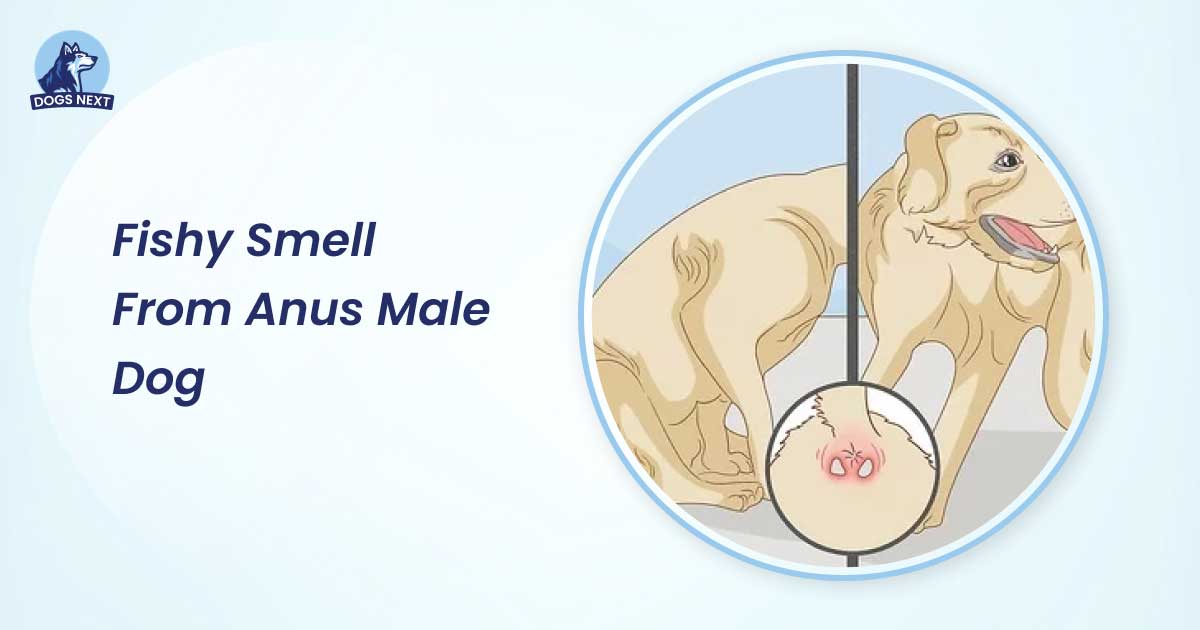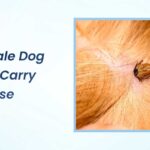A fishy smell from a male dog’s anus often indicates impacted or infected anal glands. Immediate veterinary attention is necessary.
Male dogs sometimes emit a fishy odor from their anus, primarily due to issues with their anal glands. These glands, located on either side of the anus, release a secretion that can become impacted or infected. Symptoms may include scooting, licking, and an unpleasant smell.
Ignoring this problem can lead to discomfort and potential infections. Regular check-ups and proper hygiene can prevent anal gland issues. Always consult a veterinarian if you notice persistent odors or changes in your dog’s behavior. Addressing the issue promptly ensures your dog’s well-being and comfort.
Common Causes Of Fishy Smell From The Anus
Have you noticed a fishy smell coming from your male dog’s anus? This could be alarming and unpleasant. There are several common causes for this odor. Understanding these causes can help you address the issue and ensure your dog stays healthy and comfortable.
Anal Gland Issues
Anal glands play a crucial role in a dog’s body. They produce a unique scent used for marking territory. Sometimes, these glands can cause a fishy smell.
Key points to understand about anal glands:
- Location: Near the anus, at 4 and 8 o’clock positions.
- Function: Produce a secretion with a distinct scent.
- Problems: Can become impacted, infected, or abscessed.
If the anal glands are not emptying properly, they can fill up and emit a fishy smell. This could indicate an underlying issue that needs attention.
Impaction And Infection
Impaction and infection in the anal glands can lead to a fishy odor. When the glands get blocked, they can become painful and swollen.
Signs of impaction and infection include:
- Scooting: Dragging their bottom on the ground.
- Licking: Excessive licking of the anal area.
- Swelling: Visible swelling or redness near the anus.
Infections can occur if the glands are not expressed regularly. This can result in more serious health issues if left untreated.
Diet-related Odors
A dog’s diet can significantly affect the scent of their anal gland secretions. Certain foods can lead to stronger odors.
Diet-related factors to consider:
- High-fat diets: Can cause oily secretions.
- Poor quality food: May result in foul-smelling secretions.
- Allergies: Certain foods can cause allergic reactions, affecting gland function.
Ensuring your dog has a balanced diet can reduce the risk of diet-related odors and promote overall health.
Possible Infections Or Parasites
Infections or parasites can also cause a fishy smell from your dog’s anus. These infections can lead to discomfort and health issues.
Common infections and parasites include:
- Bacterial infections: Can cause a strong odor and discomfort.
- Parasitic infestations: Worms or other parasites can lead to unpleasant smells.
- Skin infections: Infections around the anal area can contribute to the odor.
If you notice any signs of infection or parasites, consult your veterinarian for proper diagnosis and treatment.
Home Remedies To Address The Smell
Dealing with a fishy smell from the anus in male dogs can be distressing for both the pet and the owner. This odor often indicates issues with the anal glands, which can become impacted or infected. Fortunately, there are several home remedies that can help address the smell and improve your dog’s overall health.
Several home remedies can help manage and reduce the fishy smell from your dog’s anus. These remedies focus on cleaning, dietary changes, and improving nutrition.
- Regular Cleaning: Clean the area around your dog’s anus with warm water and a gentle, dog-friendly soap. This helps to remove any debris or bacteria causing the smell.
- Warm Compress: Applying a warm compress to your dog’s anal area can help soothe any discomfort and promote the natural expression of the anal glands.
- Probiotics: Adding probiotics to your dog’s diet can improve gut health and reduce the risk of anal gland issues.
- Increased Fiber: A diet high in fiber can help ensure regular bowel movements, which can naturally express the anal glands.
These remedies are easy to apply at home and can offer significant relief to your pet.
Dietary Adjustments
Dietary adjustments play a crucial role in managing anal gland issues and reducing the fishy smell. A balanced diet can promote better digestion and regular bowel movements.
Consider the following dietary changes:
- High-Fiber Diet: Incorporate fiber-rich foods like pumpkin, sweet potatoes, and green beans into your dog’s meals. Fiber helps form bulkier stools, which can naturally express the anal glands.
- Omega-3 Fatty Acids: Foods rich in omega-3 fatty acids, such as fish oil, can reduce inflammation and support overall anal gland health.
- Hydration: Ensure your dog drinks plenty of water. Proper hydration aids in digestion and prevents constipation.
Below is a table of high-fiber foods and their benefits:
| Food | Fiber Content | Benefits |
|---|---|---|
| Pumpkin | 3g per cup | Improves digestion |
| Sweet Potatoes | 4g per cup | Promotes bowel health |
| Green Beans | 2g per cup | Helps with stool formation |
Improving Nutrition
Improving your dog’s nutrition can significantly impact their overall health and reduce the occurrence of anal gland issues. A well-balanced diet ensures your dog gets all the essential nutrients.
Key nutritional components to consider:
- High-Quality Protein: Include lean meats like chicken, turkey, and fish. These provide essential amino acids for overall health.
- Healthy Fats: Incorporate fats from sources like fish oil and flaxseed. These support skin health and reduce inflammation.
- Vitamins and Minerals: Ensure your dog’s diet includes a variety of fruits and vegetables to provide necessary vitamins and minerals.
Below is a table of essential nutrients and their sources:
| Nutrient | Source | Benefit |
|---|---|---|
| Protein | Chicken, Fish, Turkey | Muscle and tissue repair |
| Omega-3 Fatty Acids | Fish Oil, Flaxseed | Reduces inflammation |
| Vitamins | Fruits, Vegetables | Boosts immune system |
By focusing on high-quality nutrition, you can improve your dog’s overall health and reduce the likelihood of anal gland problems.
Seek Veterinary Help
Dogs can sometimes emit a fishy smell from their anus, which can be alarming for pet owners. This odor often indicates an issue with the anal glands or other underlying health problems. Seeking veterinary help is crucial to diagnose and treat the issue effectively, ensuring your furry friend remains healthy and comfortable.
Signs Of Severe Conditions
Recognizing the signs of severe conditions is essential for timely intervention. Keep an eye out for the following symptoms:
- Persistent or worsening fishy smell
- Swelling around the anus
- Excessive licking or biting at the rear
- Discomfort or pain when sitting
- Blood or pus in the stool
If your dog exhibits any of these signs, it may indicate a severe condition such as:
| Condition | Description |
|---|---|
| Anal Gland Infection | Inflamed or infected glands causing a strong odor and discomfort. |
| Anal Sac Tumors | Growths that can block the glands and cause a fishy smell. |
| Perianal Fistulas | Chronic, painful sores around the anus. |
Immediate veterinary care can prevent complications and ensure your dog receives the necessary treatment.
Diagnostic
Veterinarians use various diagnostic methods to determine the cause of the fishy smell. A thorough examination is the first step:
- Physical Examination: Checking the anal area for swelling, lumps, or signs of infection.
- Medical History: Discussing any previous issues, diet, and behavior changes.
- Expressing the Anal Glands: Manually checking for blockages or infections.
In some cases, advanced diagnostics may be required:
- Blood Tests: To rule out systemic infections or underlying diseases.
- Ultrasound: Imaging to detect tumors or abnormalities in the glands.
- Biopsy: Taking tissue samples if tumors or unusual growths are found.
Accurate diagnosis is crucial for effective treatment. Early detection can help manage the condition more effectively and prevent severe complications.
Treatments
Treatment options vary based on the diagnosis. Common treatments include:
- Antibiotics: To treat infections in the anal glands.
- Anti-inflammatory Medications: To reduce swelling and discomfort.
- Manual Expression: Regularly emptying the glands to prevent blockages.
For more severe conditions, surgical interventions may be necessary:
| Treatment | Description |
|---|---|
| Gland Removal | Removing the anal glands if infections are recurrent or chronic. |
| Tumor Removal | Surgically excising tumors to prevent further issues. |
| Fistula Repair | Correcting perianal fistulas through surgical means. |
Home care is also important. Ensure your dog maintains a healthy diet and regular check-ups to prevent future issues. Consulting with a vet for a tailored treatment plan can help keep your dog happy and healthy.
Preventive Measures
Male dogs may sometimes emit a fishy smell from their anus, which can be concerning. Understanding preventive measures can help maintain your dog’s health and hygiene. By following these steps, you can reduce the chances of this issue occurring and ensure your furry friend remains happy and healthy.
Regular Check-ups
Regular check-ups with a veterinarian are essential for your dog’s overall health. These visits can help identify and address potential issues before they become significant problems.
During a check-up, the vet can:
- Examine the anal glands to ensure they are not impacted or infected.
- Check for any signs of infections or abnormalities in the anal area.
- Assess your dog’s diet and recommend changes if necessary to promote better digestive health.
It’s recommended to schedule vet visits at least twice a year. Consistent monitoring and professional advice can prevent the fishy smell and other related health concerns.
Here’s a quick checklist for your vet visits:
| Task | Frequency |
|---|---|
| Anal Gland Examination | Every 6 months |
| General Health Check | Every 6 months |
| Dietary Assessment | Every 6 months |
Grooming Practices
Proper grooming is another crucial preventive measure. Regular grooming can help maintain cleanliness and prevent the build-up of bacteria.
Effective grooming practices include:
- Bathing your dog every 4 to 6 weeks with a mild dog shampoo.
- Cleaning the anal area gently during baths to remove any debris or dirt.
- Trimming the hair around the anus to prevent matting and make cleaning easier.
- Brushing your dog’s coat regularly to reduce shedding and keep the skin healthy.
Maintaining a grooming schedule can significantly reduce the risk of infections and unpleasant odors.
Consider these grooming tools:
| Tool | Purpose |
|---|---|
| Dog Shampoo | Cleaning and maintaining skin health |
| Soft Brush | Removing loose hair and reducing shedding |
| Grooming Scissors | Trimming hair around the anus |
Monitoring
Regular monitoring of your dog’s behavior and physical condition is vital. Early detection of issues can prevent them from escalating.
Key aspects to monitor include:
- Changes in bowel movements such as diarrhea or constipation.
- Excessive licking or scooting which can indicate discomfort or anal gland issues.
- Any signs of swelling or redness in the anal area.
- Unusual changes in diet or appetite.
By keeping an eye on these signs, you can take quick action and consult a vet if necessary.
Here’s a simple monitoring checklist:
| Sign | Action |
|---|---|
| Changes in bowel movements | Consult vet if persistent |
| Excessive licking/scooting | Check for anal gland issues |
| Swelling/redness | Consult vet immediately |
| Changes in appetite | Monitor diet and consult vet |
Frequently Asked Questions
Why Does My Male Dog Have A Fishy Smell?
A fishy smell from your male dog’s anus can indicate impacted anal glands. These glands produce a fishy-smelling secretion. It’s essential to consult your vet for proper diagnosis and treatment.
How Can I Treat My Dog’s Fishy Smell?
To treat the fishy smell, your vet may express the anal glands. Proper hygiene and diet can help prevent future issues. Always seek professional veterinary advice.
Is A Fishy Smell From My Dog’s Anus Serious?
A fishy smell can signal anal gland issues, which might cause discomfort. While not usually serious, it requires attention. Consult your vet to prevent complications.
What Causes Anal Gland Issues In Dogs?
Anal gland issues arise from impaction, infection, or inflammation. Poor diet and lack of exercise can exacerbate problems. Regular vet check-ups help in early detection and treatment.
Conclusion
If your male dog has a fishy smell from the anus, don’t panic. It could be a sign of anal gland issues. Consult your vet for proper diagnosis and treatment. Remember, early detection and intervention are key to your furry friend’s health and well-being.
Take action now.

I’m David, an expert contributor and writer, with two furry friends of my own, I know the challenges of raising and caring for dogs. From training to nutrition and health, my goal is to provide valuable insights and advice to help create strong bonds and happy, healthy lives. Find me in Twitter.




